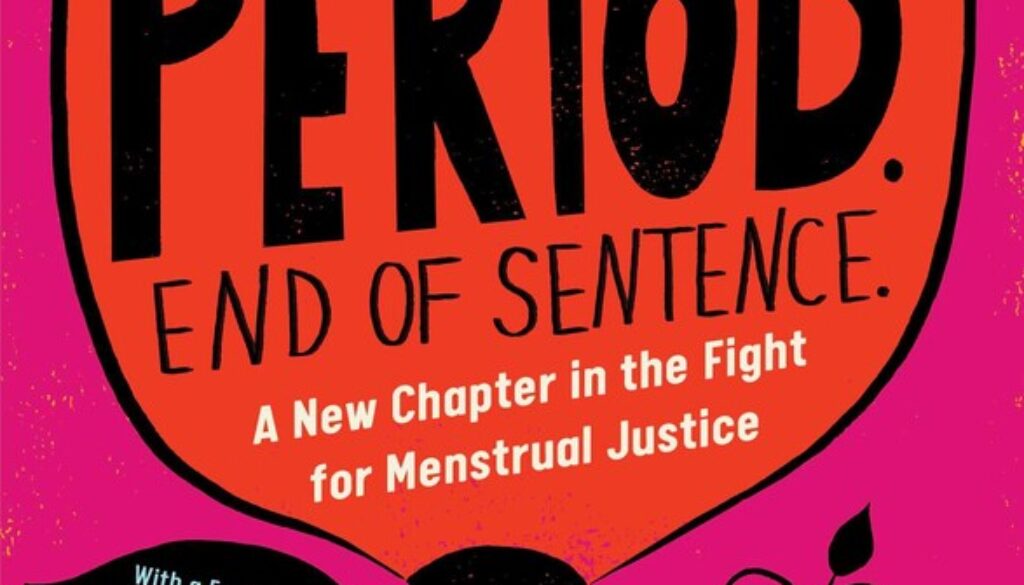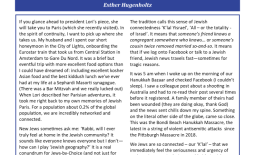The Naked Torah
Let’s talk about… menstruation, blood, sex and reproduction. Yes, this sermon comes with a content warning.
A number of years ago, in pre-pandemic times, some of us were preparing to do the Yom Kippur afternoon Torah reading. Many liberal communities have replaced the traditional afternoon reading with the ethical teachings of Leviticus chapter 19. But the traditional reading draws on chapter 18, which discusses the ‘arayot’, literally the ‘nakednesses.’ To clarify, the arayot are a summation of sexual prohibitions which mentioned shamelessly and without hesitation by the Torah’s text.
The reason to switch out these chapters of Leviticus with each other is sound: Leviticus 18 includes the traditional prohibition on male-on-male sexual intercourse and in LGBTQ-affirming congregations (like ours), we do not wish to cause distress or retraumatization to our LGBTQ family during the holiest day of the year. That year, however, I argued that as we substitute the reading for noble and legitimate reasons, we also stand to lose something: the ability to openly talk about sexual taboo, physiological function and in the case of such things as the prohibition of incest, the opportunity to name sexual, physical and emotional abuse.
Fast forward to this day and to this week’s Torah portion, and we are confronted with a similar conundrum. Parashat Tazria has the infamy of being the Torah reading no B-Mitzvah student ever wants, and it is filled with the explicit and taboo: childbirth, vaginal bleeding, mythical skin conditions and other ‘facts of life’ that make us feel uncomfortable. Parshiyot like Tazria (and Metzora) deal with sexual intercourse, bodily fluids and various medical conditions and definitely have the ‘ick’ and ‘TMI’ factor. In fact, the portion is named ‘Tazria’ because it is the opening of the chapter: ‘isha ki tazria’, literally, ‘when a woman gives seed’—or bears a child.’ What follows are instructions, depending on the sex assigned to the infant, of a time set for isolation and purification as the new mother contends with her postpartum flow.
Our Bronze Age Torah is extremely explicit in physiological matters and discusses them freely, seemingly unwilling to ascribe Victorianesque discomfort to the embodied human experience. From the Torah’s perspective, a person experiencing any type of uterine or genital emission dealt with this fact of life in a matter-of-fact way, both privately and communally. While it is difficult to construct historically how ancient Israelite society dealt practically with menstruation, the texts seem to suggest that the purity laws were a public and communal matter and dealt with as such. In other words, the community may very well have known when a woman was on her period.
This brings me to a philosophical point and a kind of Rorschach test, unresolved to this day by critical feminist Bible scholars. Is the Torah misogynist and retrograde for assigning a gendered and self-limiting experience to people’s natural bodily functions? In other words: are menstruators being singled out for discrimination? Or, is the Torah’s frank acknowledgement of such bodily matters actually a type of honest liberation, reminding us of the normalcy of such things? After all, we read this text publicly, on this holy bimah, in this sanctified space, affirming, at least in principle if not in belief, the divinity of this text. And as we stand here, gathered round, with the scroll upon the table, the Torah undone of her velvet and silver finery, we have before us a naked Torah: honest, raw, real, speaking to the most intimate aspects of our lives and our bodies.
Last June, I had the honor of attending the Women’s Rabbinic Network, an annual conference of female identifying Reform rabbis. The keynote speaker was the author Anita Diamant, renown for writing ‘The Red Tent’, and she was presenting her new book: ‘Period. End of Sentence – A New Chapter in the Fight for Menstrual Justice.’ It’s not a long book, and an accessible and engaging read. In it, Diamant makes the multifaceted argument that given the fact that over 50% of the human species are menstruators, it is paramount to fight for menstrual justice, access and support, both in the global North and South. In the South, this may include access to basic period products and dismantling menstrual taboo. In the North, there is plenty of work to be done also: there still remain pockets of ‘period poverty’ where women – especially school students and college students – cannot acquire sufficient menstrual products, restricting their ability to participate in society. There remains a fight for work place accommodations as well as facing off against anti-female bias in the medical system. Anita Diamant also speaks out for menstrual rights for those who do not identify as women but have uteri: non-binary folks and transgender men.
The book illustrates the case of a project developed on the rural outskirts of Delhi, where a group of women come together to build a pad-producing machine to make affordable sanitary pads for the women in the community known as the Pad Project. A documentary featuring this project has been viewed by tens of millions of people around the world. In her book, Diamant dismantles, chapter by chapter, what contributes to menstrual injustice.
‘The curse is shame’ Anita Diamant notes. Detailing stories from antiquity to modernity, from Judaism to Hinduism to Christianity and Islam and every culture and faith in between, she argues that it is the inability to see menstruation nakedly – as in: for the simple, physiological reality it is – and name it without embarrassment or taboo that contributes to women’s suffering.
“Nobody is born with an innate sense of shame about menstruation”, she writes, “it must be taught. And the message doesn’t have to be as explicit as ‘you are cursed’. Unspoken scorn, institutional exclusion, and the example of the women around you sends the message, loud and clear. The harm is not equally distributed. And while privilege and education can mitigate the harm, virtually everybody who menstruates knows how it feels to be ashamed of your body, ashamed of yourself.”
Our naked Torah can help shift the shame and reshape the narrative. Leviticus as a whole does not shy away from ‘guts and gore’ from its inception of the sacrificial laws. However, from this week’s portion onwards, we will be journeying with the exposure of the deeply intimate, the ‘arayot’ if you will, the ‘nakednesses.’ We read about childbirth, menstruation, seminal emissions, sexual intercourse, skin lesions, mold-infested houses, transgressive sexual behaviors and their attendant prohibitions, power differentials and a plethora of cultic taboos. We have the power to determine how we read these texts; either as taboo or as revelatory. We can choose to read them as giving us agency to have necessary conversations about the sanctity of the embodied experience. Our bodies do things. Beautiful, weird, awe-inspiring but also mundane things. To name these is to see our physicality in its fullness; our vulnerability and our strength. To reveal the naked Torah is to arm ourselves with humanity and dignity. To learn the naked Torah is to create a newer and healthier way of being in the world.
You may have noticed that the culture has been shifting. Even through the course of my life time, televised period advertisements have shifted from the frustratingly coy to the unflinchingly and refreshingly honest. In the global North, at least, we have a wide range of improved menstrual products to manage nature’s cycles with more dignity and comfort. We have pushed for more inclusivity on how we see the dignity of the body: different sizes, different genders, different ways to be in the world. We speak more openly about the wonders and traumas of pregnancy and childbirth. For all the setbacks and challenges of our age, I feel at least, that there is less tension in my body and more air in my lungs to be a human being inhabiting a female body.
The naked Torah is not a perfect Torah; it still requires our active redemption. We still need to peel away its layers of notions of impurity, patriarchy and taboo. The second clause of our opening verses addressing the childbearing woman describes how long a postpartum woman must isolate herself and rid herself of this nebulous and mysterious concept of ‘tum’ah’ (impurity). (Hint: do not read Rashi, Ibn Ezra or any of the other commentaries on this verse – the 12th century commentator Ibn Ezra flat out states that having a period is ‘a form of sickness’). Still, that is a sermon for another day.
Lifting the taboo, awakening consciousness and making available resources (like free and available period products in all the bathrooms of our building) are small steps we can take. Meanwhile, may we all find a truer form of human expression and a freer and holier way to be in the world through the prompting of our naked Torah.



